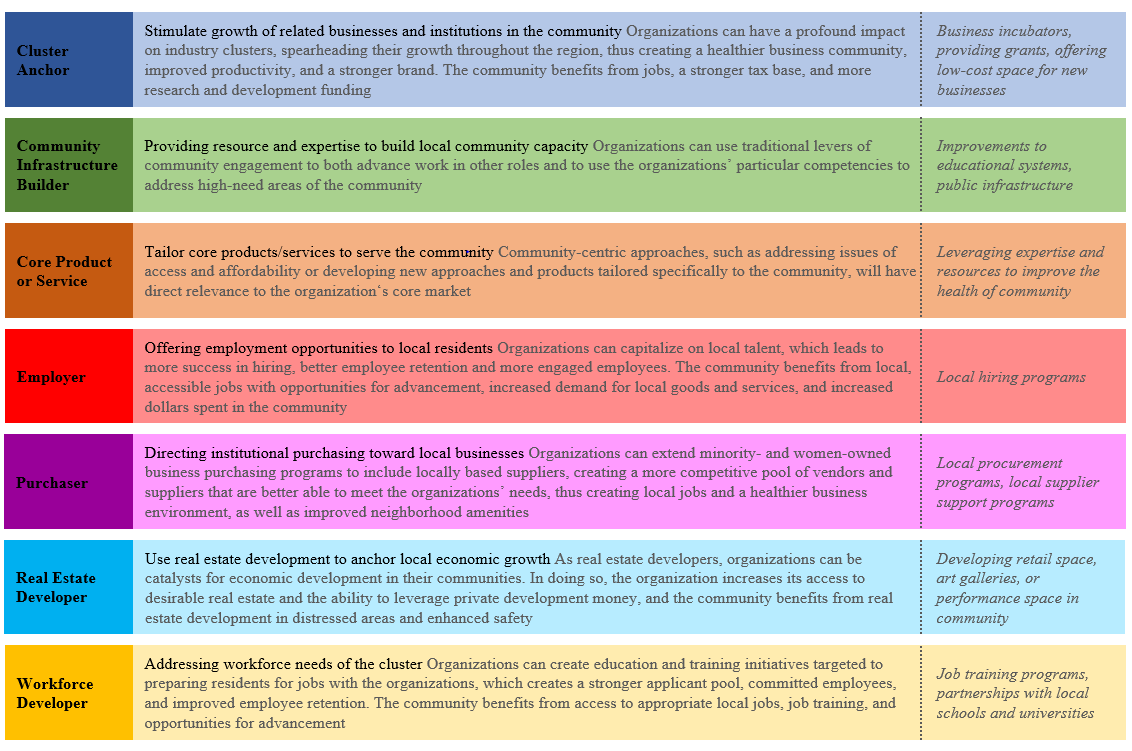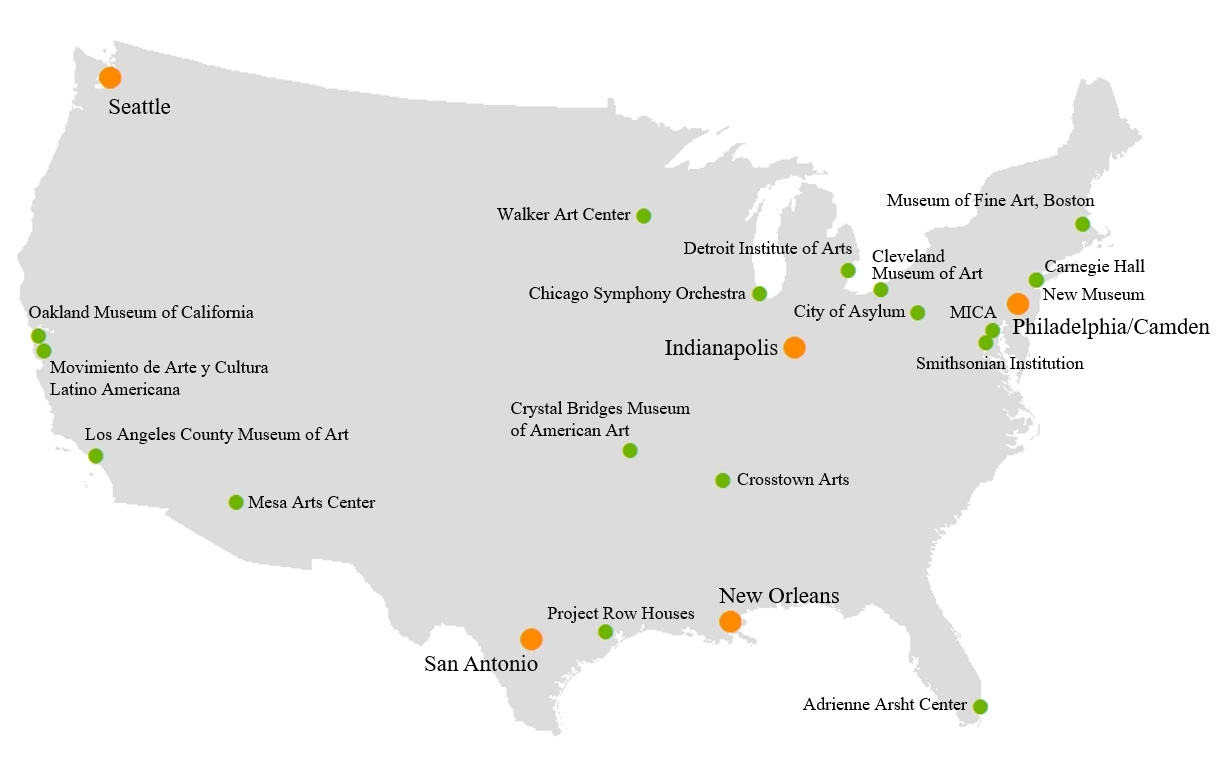Back

Blog
Arts and Culture Organizations—The Overlooked Anchors
Written by Kim Zeuli and Zachary Nieder
Anchor organizations have strong roots in their local communities because of their history, institutional mission, significant capital investments, land holdings, or reliance on local markets. They already play a significant role in the local economy and have a long-term interest in seeing their local communities thrive.
“Eds and meds” are the conventional anchors—and remain the focus of most anchor initiatives. But a few arts and culture organizations, such as the New Jersey Performing Arts Center in Newark and Yerba Buena Center for the Arts in San Francisco, are beginning to change the narrative, claiming seats at anchor collaboration tables in their cities and begging the question—why aren’t more arts and culture organizations adopting anchor strategies?
Most arts and culture organizations are as deeply rooted in their communities as hospitals and universities. Large museums, performing arts centers, and other arts and culture institutions may close, but they rarely move to another location. They often have significant assets to leverage and already play a significant role in local economies, especially in distressed inner cities.
In total, arts and culture organizations represent just over four percent of U.S. gross domestic product ($763.6 billion) and support nearly five million jobs, of which 12 percent are in the inner city. Performing Arts organizations are particularly important for inner cities: 24 percent of all Performing Arts jobs are in the inner city.
A New Partnership at the Intersection of Anchors and Arts and Culture
The Initiative for a Competitive Inner City (ICIC) and the Kresge Foundation’s Arts and Culture Program are working together to answer this fundamental question, to catalyze more arts and culture organizations to adopt anchor strategies and increase equitable economic growth in their communities. The partnership brings together two organizations with deep expertise in anchor strategies (ICIC) and arts, culture and community development (Kresge).
Over the past fifteen years, ICIC has been at the forefront of anchor research and practice, providing thought leadership in the field and practical guidance for organizations and cities interested in implementing anchor strategies to maximize economic opportunity.
Kresge’s Arts & Culture Program primarily focuses on Creative Placemaking, an approach to equitable community development and urban planning that integrates arts, culture and community-engaged design strategies. Kresge’s unique niche in Creative Placemaking is demonstrated through a commitment to influence community development-related systems and practices in ways that expand opportunities for people with low incomes in cities.
ICIC’s Strategic Anchor Framework
A Rigorous Inquiry into the Issue
ICIC and Kresge’s research will address gaps in understanding key drivers of anchor engagement by arts and culture organizations. Are their incentives different from other organizations? Do they face unique barriers? Based on theory and experience, we have developed a set of hypotheses on drivers for anchor engagement that include the role of external forces (depressed economic and social conditions), funding pressures, and the presence of other anchor collaboration initiatives in their city. Hypotheses on internal forces include the effect of new leadership, board members from other organizations that act as anchors, and the age and type of organization.
The research is guided by an advisory committee consisting of representatives from diverse arts and culture organizations, arts-focused nonprofits, academia, community development organizations, public agencies, foundations and anchor collaboratives.
To test these hypotheses, we will conduct in-depth research on 18 arts and culture organizations across the country that represent different levels of anchor engagement and control for differences in other organizational characteristics (size, type, board composition, etc.). We made a concerted effort to surface new examples and models of arts and culture organizations implementing strategic anchor initiatives, beyond the usual suspects already covered in other reports.
We will also test our theories by reviewing six cities across the U.S., analyzing how the different economic, demographic, cultural and structural contexts of each city influences anchor engagement by local arts and culture organizations.
Cities and Organizations Included in Our Research
 Expected Outcomes
Expected Outcomes
The research will highlight a variety of models for anchor engagement to resonate with the broadest possible spectrum of arts and culture organizations. We want all types of organizations, in all types of settings, to read about a situation that is similar enough to their own to be useful and inspiring. We will also surface anchor practices and strategies relevant to the missions and day-to-day operating realities of arts and culture organizations, which fills a gap in the current offerings focused on eds and meds.
The research will also integrate insights from Creative Placemaking, a powerful platform for arts and culture organizations to address cultural, community and economic development in their communities. We will highlight the complex interplay between Creative Placemaking and anchor engagement, neighborhood investment, and long-term community stability.
Ultimately, the research will provide inspiration and guidance for arts and culture organizations, funders and the public sector on how these organizations can leverage their strong community ties and assets to drive deeper engagement in their communities. By doing so, ICIC and Kresge seek to magnify the existing and potential impact of arts and culture organizations as catalysts of equitable economic growth in U.S. cities.
